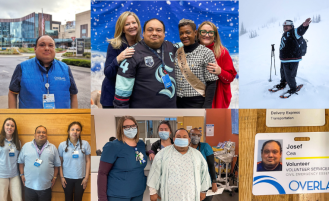Spring Renewal: A Fresh Start Post-Pelvic Surgery
April 24, 2024
Like many Washington residents, Lynn Sturgeon, an active 75-year-old, has been counting the days to spring. With the warmer temperatures, she’s ready to paddle her newly purchased kayak in the scenic waters near her home. Since having successful pelvic surgery in the fall, Lynn is back to doing all the outdoor activities she loves most.

Lynn had been dealing with a prolapsed uterus resulting from childbirth for a couple of years. But, in Aug. 2023, the situation’s urgency became more apparent, with the prolapse suddenly worsening. Pelvic organ prolapse (POP) is one of the most common pelvic health conditions and can occur when pelvic organs shift out of place, similar to a hernia. As in Lynn’s case, it’s common for women to have no POP symptoms until the prolapse advances to a late stage.
Unable to ignore the problem any longer, Lynn consulted with her ob/gyn, who referred her to Kathryn Arendt, MD, a urogynecologist specializing in robotic and vaginal reconstructive surgery.
"I felt I was in such good hands, so safe and could breathe comfortably." – Lynn Sturgeon
Since Lynn was experiencing her first episode of prolapse, Dr. Arendt recommended a transvaginal approach to repair. “This approach is the least invasive, safest and has excellent long-term results,” adds Dr. Arendt.
Lynn says she had a sense of trepidation facing surgery but recalls Dr. Arendt’s comforting words: “Right before surgery, she looked at me and said, ‘I will take good care of you,’ and I believed that she would,” Lynn reflects.
In a transvaginal prolapse repair, the uterus is removed (hysterectomy) through a small vaginal incision—enabling the surgeon to address the weakened pelvic floor and reinforce tissues damaged by prolapse. “This procedure is less invasive than other reconstructive surgeries, reducing pain and making recovery easier,” explains Dr. Arendt.
Lynn recalls feeling pleasantly surprised following surgery, “I had absolutely no pain and didn’t need any medication. I was out Christmas shopping two days after the hysterectomy,” she laughs.
Looking back, Lynn laments that she only has one regret: “I wish I hadn’t waited so long to have the procedure. If I knew what I know now, I would have had it much sooner.”
The Overlake Pelvic Health Clinic has a team of urogynecologists and female urologists who are transforming life for women with pelvic health challenge
Pelvic Health Classes & Events
Discover techniques to improve your pelvic floor and gain practical tips and insights from our experts:
- Pelvic Floor Power Up (Postpartum), Tuesdays, May 14–June 18, 4:45–5:45 p.m.
- Women’s Pelvic Health Symposium, Thursday, May 16, 5–6:30 p.m. Free.
- Pelvic Floor Wellness: Individuals 30+, Thursday, June 13, 6–8 p.m. Free.








